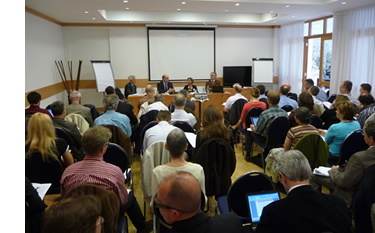
EPPO Workshop on the development of principles for Comparative Assessment in the framework of substitution
Brussels, 2009-05-06/07
Outline
The new EU regulations concerning the placing of plant protection products on the market will shortly come into force, repealing Council Directives 79/117/EEC and 91/414/EEC. From this point onwards, whenever a plant protection product contains an active substance that has been identified as a candidate for substitution, EU Member States will need to perform comparative assessment when evaluating an application for authorization. An EPPO Workshop was held in Brussels on 2009-05-06/07 in order to:
- define how to perform comparative assessment and substitution in practice, in relation to the new regulations
- identify the areas where further guidance is needed for the implementation of the new regulations
- determine how EPPO as a scientific and technical organization may assist its member countries in implementing the new regulations
- determine the effects of new EU regulations on other non-EU EPPO countries
- define the implications for existing EPPO standards and the need for drafting new standards.
A total of 61 participants attended the Workshop, the majority being officials from the national regulatory authorities of 17 EPPO countries. The other participants were representatives of crop protection companies, ECPA, the European Commission, COPA-COGECA, and Farmers Unions. The Workshop was organized into alternating lecture sessions, smaller working groups and plenary discussion sessions.

The lecture session started with an overview of the current situation on the implementation of the new European Regulation for the approval of plant protection products, outlining the key changes in the scope of the Regulation including Comparative Assessment. Mr Richardson presented an assessment of the impact of the new criteria, including Comparative Assessment, on the availability of currently available active substances. As part of their own system for issuing authorizations for plant protection products, the Swedish Chemicals Agency has conducted Comparative Assessments for some time. Mr Bergkvist presented the Swedish tiered approach of conducting these assessments, outlining experiences and practical examples. Mr Peeters presented the viewpoint of the European farmers on the context of Comparative Assessment, with particular respect to the issues of IPM compatibility, resistance management and minor uses. Mr Rotteveel and Ms Petter discussed the potential consequences of changing the portfolio of available plant protection products and highlighted the phytosanitary issues that will need to be considered when applying Comparative Assessment. Mr Sterk presented an overview of the range of biological solutions that are currently available to compliment chemical control in agricultural systems. The presentations generated a lot of questions and were an excellent introduction into the 6 Working Groups which addressed more specific questions (i.e. herbicides, insecticides, fungicides, resistance, minor uses, and wider scope issues). The participants had the opportunity to express their views and concerns, discuss the implications for registration authorities, industry and farmers, and make proposals for further development. Each working group produced a set of conclusions which were then taken to a final plenary session to elaborate the final conclusions and recommendations of the Workshop. It is hoped that these these final conclusions and recommendations will be noted by the registration authorities and the crop protection industry, and by the EPPO Working Party on Plant Protection Products when deciding its future programme of work.
The Workshop agreed that this meeting had been a good opportunity to develop an understanding of how to implement the comparative assessment. Warm thanks are due to all members of the Organizing Committee who have largely contributed to the success of the Workshop.
Presentations (lecture session)
Update from the European Commission on the new Regulation on plant protection products
Wolfgang Reinert - DG Health and Consumer Protection (European Commission)Anticipated effects of the plant protection products regulation on plant protection products availability and the role of comparative assessment
David Richardson - Chemical Registration Directorate (GB)Views on the plant protection products regulation based on previous Swedish experiences of comparative assessment and substitution of plant protection products
Peter Bergkvist - Swedish Chemicals Agency (SE)Comparative Assessment and Substitution: The recommendations of EU farmers
Luc Peeters - COPA-COGECAPlant protection products and phytosanitary measures: a thought starter
Ton Rotteveel - Plant Protection Service (NL) & Françoise Petter (EPPO)The consequences of further reduction of plant protection products on biological control and Integrated Pest Management
Guido Sterk - Biobest
Results of the Working group sessions
Before the working group sessions, Per Kudsk (University of Aarhus, DK) gave an introduction to the issues to be addressed by the Working Groups. The Working groups were then asked to address the following aspects of comparative risk assessment:
- Efficacy by discipline: fungicides, insecticides and herbicides (comparison of chemical solutions; comparison with non-chemical alternatives; IPM; impact on yield and quality; other factors to be considered by regulators)
- Assessment of significant practical or economic disadvantages
- Resistance strategy evaluation in the context of comparative assessment (define ‘adequate’ chemical diversity of the active substances; identify the implications on the current EPPO standard PP 1/213 Resistance risk analysis)
- Minor uses (the consequences on minor use authorizations)
- Other wider scope issues that were addressed at the meeting, but which were not within the main scope included special derogation procedures; environmental considerations; phytosanitary implications (including the definition of ‘serious damage to plant health’); recommendations for documentation for procedures to support plant health issues; food security, etc.
Organizing Committee
Miriam Cavaco, Direcção-Geral de Agricultura e Desenvolvimento Rural, Oeiras (PT)
Ann de Cock, Federal Public Service of Public Health, Food Chain Safety and Environment, Brussels
Udo Heimbach, Julius Kühn Institute, Braunschweig (DE)
Per Kudsk, Faculty of Agricultural Sciences, University of Aarhus, Flakkebjerg (DK)
Paul Leonard, BASF, Brussels
Andy Leadbeater, Syngenta, Basel
David Richardson, Pesticide Safety Directorate, York (GB)
Ton Rotteveel, Plant Protection Service, Wageningen (NL)
Maarten Trybou, Federal Public Service of Public Health, Food Chain Safety and Environment, Brussels
European Commission (Wolfgang Reinert, Louis Smeets, Francesca Arena)
EPPO (Robert Sunley, Vlasta Zlof)
